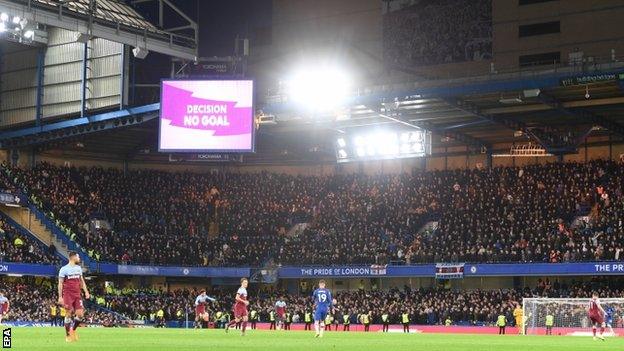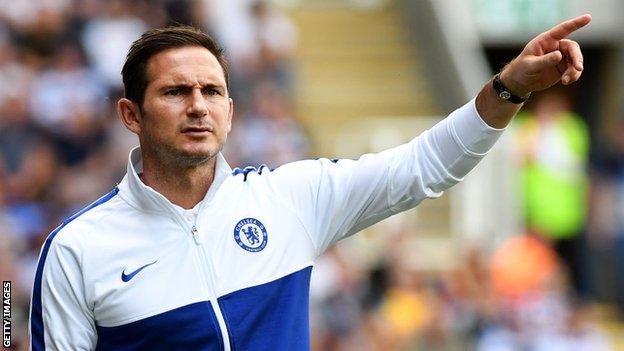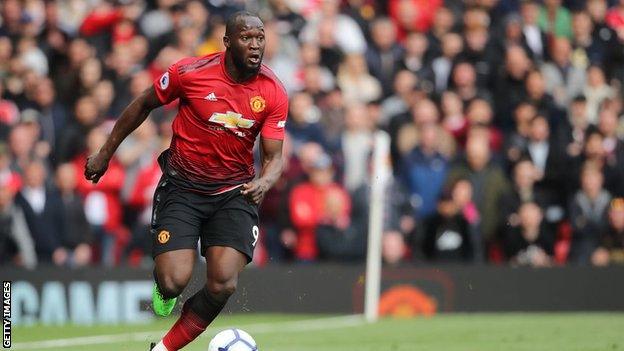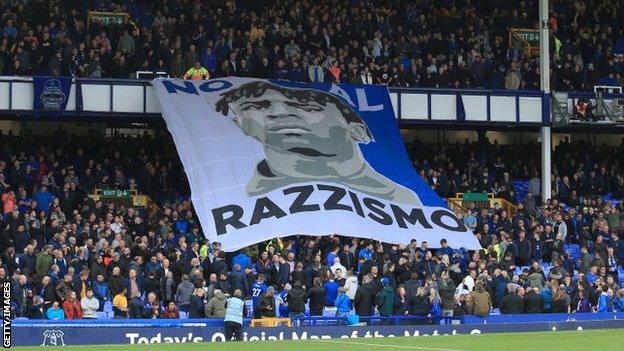Bigotry in football: How do you stop discriminatory chanting?
- Published

Offensive chants were heard during the Premier League game between Chelsea and West Ham at Stamford Bridge on 2 December
This article contains language people may find offensive.
When hundreds of West Ham fans sang a homophobic chant during the recent Premier League match at Stamford Bridge, it was nothing new to Tracy Brown, the co-chair of Chelsea Pride.
She has heard the song many times but what "sickened" her on this occasion was the number of those singing it - despite football's ongoing efforts to make the game more tolerant.
The match took place as Premier League clubs began a two-week campaign to support Stonewall's Rainbow Laces campaign, but a different version of the song was heard during Chelsea's next game at Everton on 7 December.
There have been no arrests despite investigations by corresponding police forces.
While clubs and police are quick to punish individual incidents of discriminatory behaviour, taking action against larger groups can prove more difficult.
But can anything more be done?
When do fans cross the line?
The homophobic chant at Stamford Bridge - "Chelsea are rent boys, everywhere they go" - is not the only discriminatory song heard this season in an English football ground. It shows that, in some cases, more education or action is needed.
Chelsea have been trying to stop their fans singing a song about manager Frank Lampard which includes the word "pikeys" - a derogatory term for Gypsies and Travellers.
Some Tottenham fans regularly use the word "Yid" in their songs - in a good-natured reference to their large Jewish fanbase, although others find it highly offensive. Yid means Jew in Yiddish.
But that usage - as a "self-designated nickname or slogan" - has been criticised by the World Jewish Council, and can lead to rival fans using the word in an anti-Semitic way. Spurs recently consulted their fans and of 23,000 responses almost half said they wanted supporters to use the word less or stop using it altogether.
Brown says she and her organisation - which has been backed by anti-discrimination body Kick It Out - have been "bombarded" with abuse from supporters since they explained on social media why use of the phrase "rent boys" is homophobic.
According to freelance journalist Dan Levene, who has highlighted the Lampard song on social media this season, some Chelsea fans have questioned whether "pikey" is offensive.
But he says: "There are others who are older and they know what the terms mean but when people tell them it's offensive, they ignore it and sing the songs anyway."
He believes that's when harsher sanctions are needed.

Frank Lampard asked Chelsea fans not to sing a song about him which included an offensive term
Would harsher punishments work?
When individual fans hurl racist or homophobic insults, they can be swiftly sanctioned.
Last Monday, two Wolves fans were arrested for homophobic abuse a day after their team's game at Brighton.
But no club has taken the step of banning fans en masse, and some claim it would be difficult to do so.
Some say identification can be hard because away fans in particular often do not sit in the correct seats, and CCTV frequently does not include accompanying audio. Kick it Out also questions if it would be fair to ban a small group of fans if hundreds were taking part.
But Brighton believe if authorities want to find groups of fans guilty of discriminatory chanting, they can, although they accept it could be a drawn-out process.
Levene believes making an example of fans would act as a strong deterrent.
"If they took 100 people and banned them, others would soon get the message," he says. "It would be a big job, but for a Premier League club it wouldn't cost a lot in relative terms."
Unlike Uefa, which can punish clubs or national associations for fans' behaviour through a strict liability clause, the Football Association leaves sanctions to the police or the club.
For mass discriminatory chanting, however, it can take action. Millwall were fined £10,000 after fans chanted racist language during an FA Cup tie last January, so there is a precedent.
After the "rent boy" chants, the FA said it was not investigating the incidents but added it was in ongoing discussions with the police and Kick It Out to determine what language is deemed discriminatory.

Manchester United striker Romelu Lukaku spoke out about chants about him from United fans
Can you appeal to a more tolerant fanbase?
New Kick It Out chair Sanjay Bhandari is among those who believe football is more tolerant than it used to be, and believes education and a less draconian approach can bring success.
That includes fans policing themselves and targeted messages from managers and players, which carry more weight.
When Lampard learned about the song which included an offensive term, his message to fans was clear: "I don't want to hear that."
In 2017, Romelu Lukaku asked Manchester United fans to stop singing a song about him that Kick It Out said was "offensive and discriminatory". The club said "action would be taken against any offensive behaviour".
Brown says the best way to stop chants would be to enact the three-step protocol used by Uefa during England's game with Bulgaria, where players were targeted with racist abuse.
"Players stopping the game or walking off would be a huge deterrent," she says.
Kick It Out says respected fan accounts can use their influence too, but Brighton say they want to take responsibility for their fans.
"We won't hide this behaviour," Albion deputy chairman Paul Barber told BBC Sport earlier this year. "We are not going to bury these incidents for the sake of the reputation of our club."
Chelsea are also stepping up their approach by employing an intelligence officer to speed up their investigations.
After the incident at Stamford Bridge on 30 November, there was no threat of sanctions in West Ham's statement, but they underlined their ongoing support to the LGBT community, and said representatives were on the official supporters' board.
The West Ham Independent Supporters' Association added: "We can categorically state that we are opposed to discrimination in all forms."

Kick It Out say that messages direct from fans can often be the most powerful - as Everton showed with their 'No al Razzismo' in support of striker Moise Kean